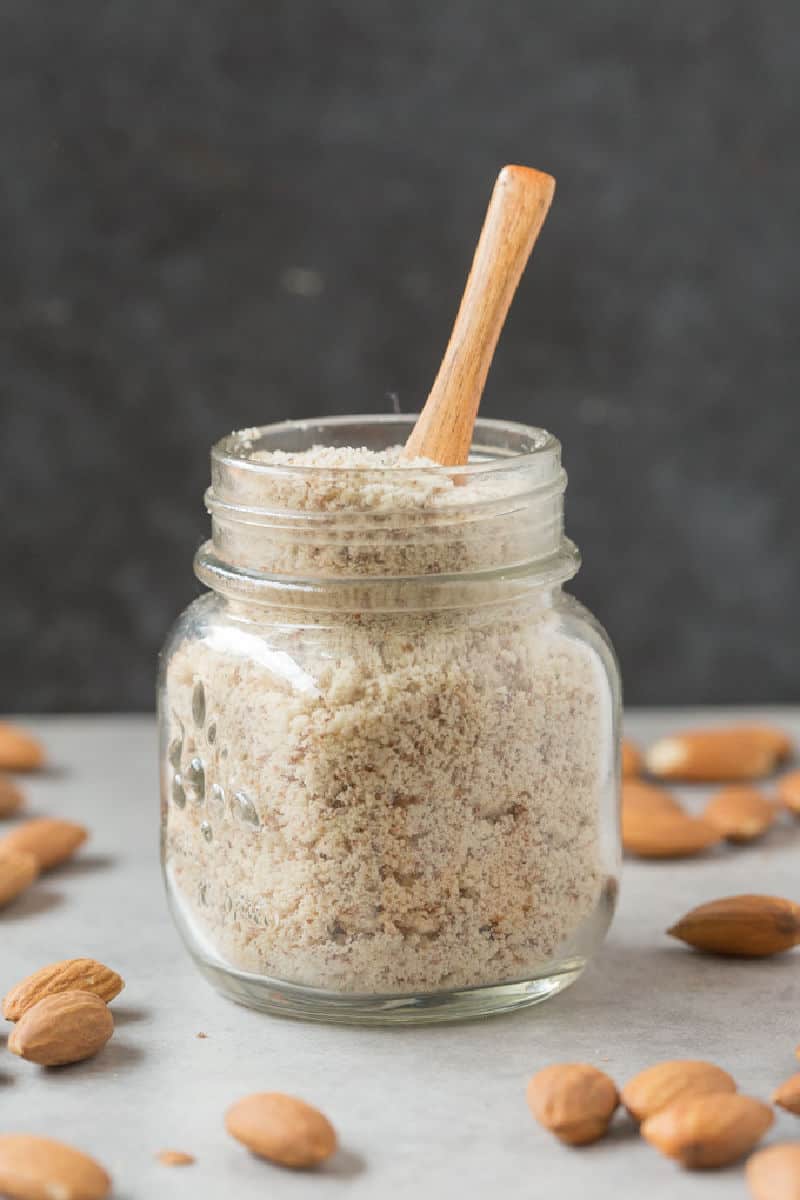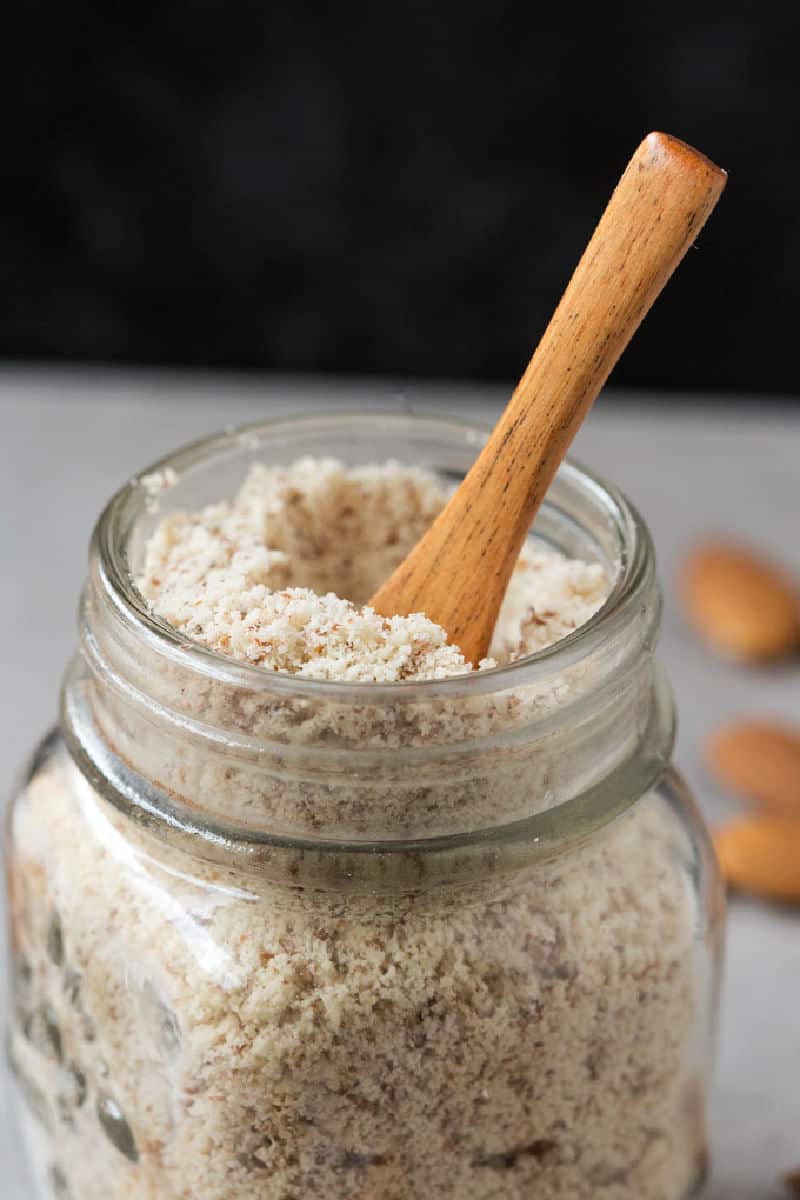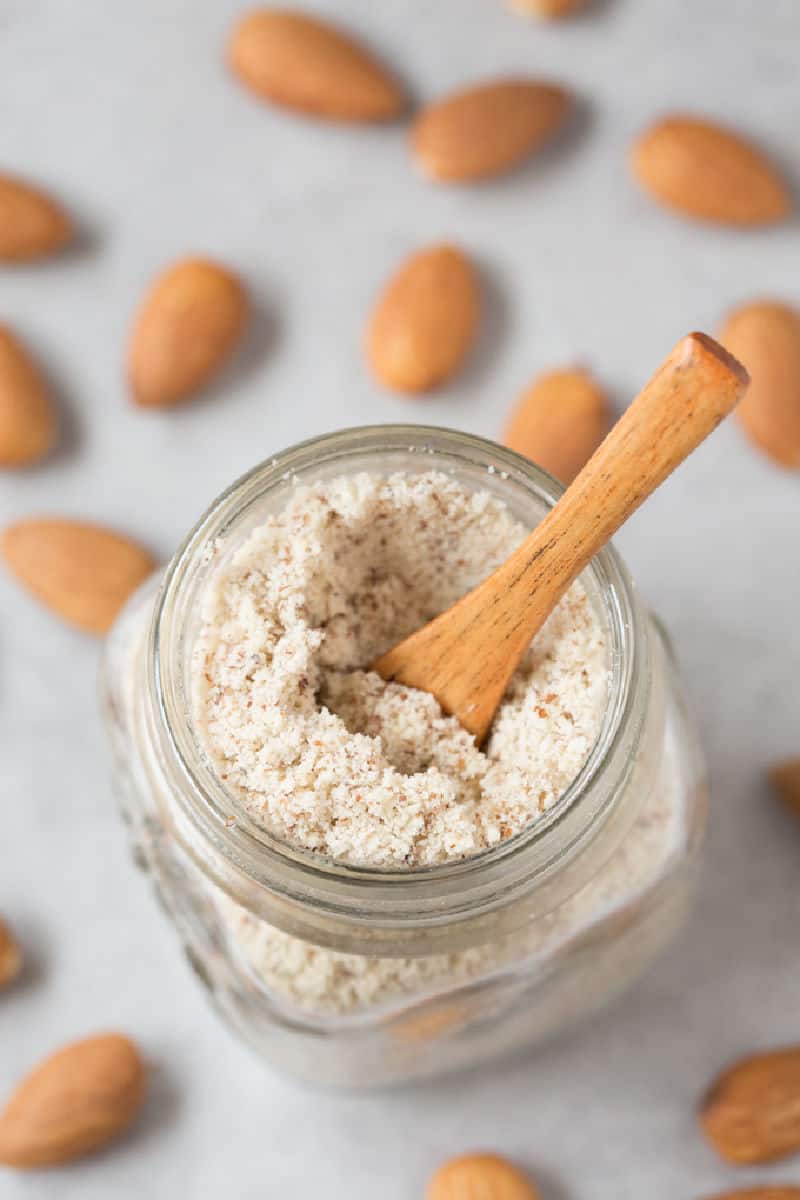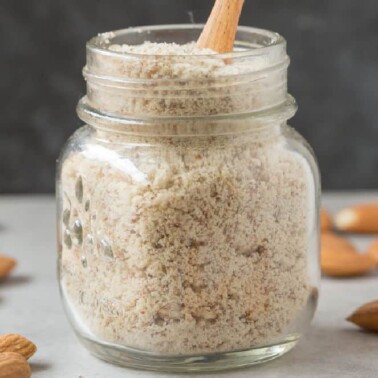Blanched Almond Flour
This post may contain affiliate links. See my disclosure policy.
Follow my blanched almond flour recipe, and you’ll NEVER buy it at the store again! All you need is one ingredient and your handy food processor.
Ready to use your homemade almond flour? Try it in my almond flour waffles, almond flour brownies, and almond flour sugar cookies next.

When I’m watching my carbs or making a gluten-free treat for friends, I sometimes find myself quite limited with what I have to work with–especially when it comes to pantry staples.
As someone who loves experimenting in the kitchen, I’ve tried almost every flour alternative. Some are better than others, but none are as good as my homemade almond flour!
What is blanched almond flour?
Contrary to its name, almond flour isn’t actually flour. It’s made of almonds ground into a fine texture. As opposed to almond meal (made from whole almonds), I prefer blanched almonds, as they make for a lighter, more flour-like product.
Table of Contents
Why I love this recipe
- It’s so easy. All you need is one ingredient and one food processor, and it’s ready to use in minutes.
- Cheaper than store-bought. Compared to name-brand flours, mine comes in at pennies on the dollar.
- Make it whenever you need it. When I open my baking cabinet and only find little cobwebs, I used to feel defeated. Now, I just whip up a batch of almond flour.
- Versatile. With a slightly nutty flavor compared to wheat flour, it’s a great addition to cakes and cookies or a grain-free substitute for gluten-free or keto recipes.
- Full of health benefits! It’s naturally gluten-free, low-carb, fiber-rich, and surprisingly high in protein, vitamins, and minerals.
Ingredients needed
- Blanched OR raw almonds. Look for specifically ‘blanched’ organic almonds, as any other kind won’t give us the proper texture. If you can’t find blanched almonds, use skinless chopped, slivered, or flaked almonds.
How to make blanched almond flour
I’ve included step-by-step photos below to make this recipe easy to follow at home. For the full printable recipe instructions and ingredient quantities, scroll to the recipe card at the bottom of this post.
Step 1- Blend. In a high-speed blender or food processor, add the blanched almonds and blend until a superfine powder remains. Shift the flour with a spatula and continue blending until smooth.
Step 2- Store. Transfer the flour to a sealable container or jar.

Can you substitute all-purpose flour for almond flour?
Generally speaking, if you want to substitute regular flour for almond flour, stick to a 1:1 ratio. You’ll want to add more liquid or egg to bind the almond flour as it’s not as absorbent.
I suggest sticking with recipes that have been tested with almond flour, as the taste and texture can sometimes be drastically different.
Arman’s recipe tips
- Scrape down the sides of the blender. So it gets evenly blended.
- Take your time. Blend slowly, lest you accidentally turn your flour into almond butter (not that that’s such a bad thing!).
- Blanch your almonds. Place them in a mixing bowl and cover them with boiling water. Let them sit for about 1 minute, then drain them and place them on a kitchen towel. Rub the skins off with the towel, then let them dry completely.
Storage instructions
To store: Almond flour can be stored in an airtight container at room temperature for up to six months or in the refrigerator for up to one year.
To freeze: Place the flour in a freezer-safe bag and store it in the freezer for up to six months.

Frequently asked questions
Blanched almond flour is made with skinless almonds, making it lighter in color and fluffier. Almond meal is made from ground-up almonds with skins, is darker in color, and has a coarser texture.
Technically, yes, any type of tree nut can be turned into flour simply by blending.
Recipes using almond flour
- Almond flour pancakes
- Keto crackers
- Keto bread
- Almond flour muffins
- Or any of these almond flour recipes

Blanched Almond Flour
Ingredients
- 1 cup blanched almonds
Instructions
- In a high speed blender or food processor, add your blanched almonds and blend very well, until a superfine powder remains. Shake the flour and blend once more, to ensure it is completely blended.
- Transfer your flour into a sealable container or jar.














Hi Arman. I’m from Australia, and I suspect that our Blanched almond flour is coarser than in America and Europe. Would it work putting the commercially bought flour through the blender again?
Hi Val, yes you should be fine using a blender to make the flour more fine. Just make sure your blender is dry, you pulse carefully and work in small batches. Over blending will make it clumpy or even buttery!
I have veery small food processor. I would need more time haha. But thanks.
Very nice. I made my homemade almomd butter so next time I will make my own almomd flour.
Very interesting. I was always curious how you make almond flour by yourself!
This is good. I needed to see that. Almond flour to buy is expensive so this is cheaper.
The best ever recipes, orientation, experiment with food in the whole world. You are fenomenal. Please never stop what you are doing. God bless you.
I’m new to using almond flour and love the idea of making my own. I’d like to have an idea of how much almond flour I will be making so I can be sure to have proper storage for it. Can you please tell me how much almond flour will be created using your recipe if I use one pound of almonds?
I just love your recipes and the huge variety of dishes and deserts. Have you published a book with all these wonderful recipes that I can purchase? If not, you really should. I’m sure it would be a bestseller for all the keto dieters.
I have two, but a new one coming out later this year 🙂
I was wondering if I have a tree nut allergy ( coconut products seem to be ok) what can I use instead of almond flour? Your recipes look wonderful but need to exchange the almond flours.
I don’t experiment with other flours in recipes calling for almond flour 🙂
So easy and quick. Love it! Thank you so much.
So welcome!
Hi Arman,
I follow keto and love your recipes and tips.
You give me lots of ideas to make following keto easier.
Thank you very much!
You are so welcome, Laurel!
Brilliant. So much cheaper and easy peasy. Thank you 🙂
Absolutely! 🙂